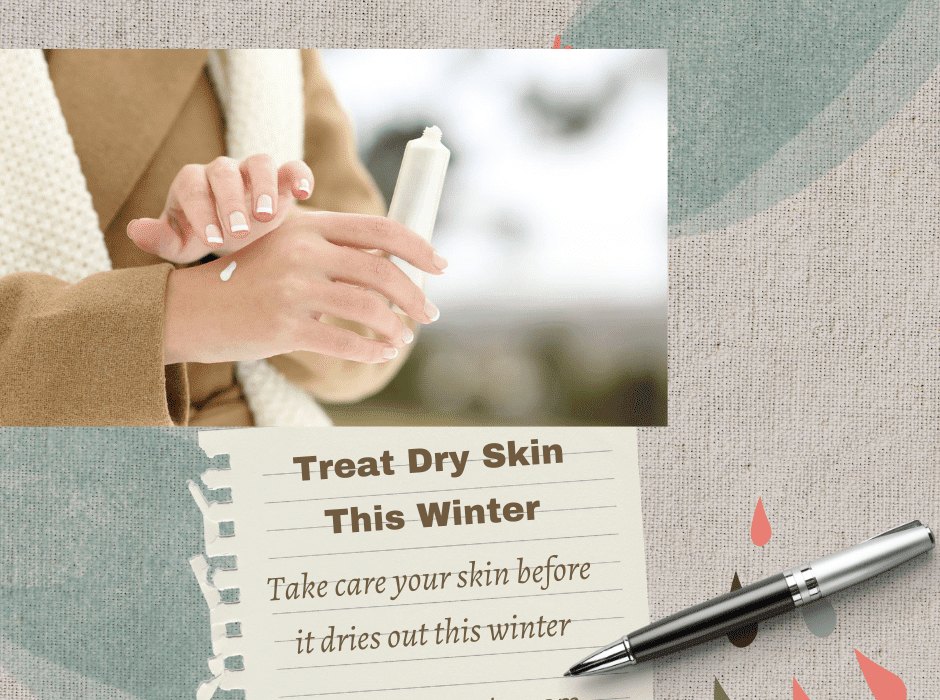In the winter season, dry skin is a matter of common experience that is scientifically termed as “xerosis”, and commonly known as moisture. The skin under our nose, face, chin, around our mouth is made up of an epithelial layer called the stratum corneum. This layer protects our skin from sunlight, harsh environment, and chemicals.
It comprises dead skin cells of about 15ųm, these act as moisture lockers and keep skin naturally fresh and soft. In the winter season, dry skin is a major problem and it fades the skin. Humidity level decreases with a drop in temperature and dry air creates a worse condition whether it is outside or inside due to heaters. The space in between the stratum corneum loses and releases the locked moisture that makes the skin dull, itchy, and scratch on hands, arms, thighs, calves, on face chin, around the mouth, and on foot.
Health conditions
Dermatologists suggest that dry skin is the beginning of the vicious cycle of the body in the winter season. Dry skin also occurs because of underlying health conditions like hormonal imbalances (thyroid condition), after chemotherapy, and by taking heavy medicines. The good news is dry skin can be taken care of with many home remedies and skincare products.
Treatment of dry skin
Skincare regimes help in dealing with dry skin problems at home and these are as follows:
Coconut oil: Saturated fatty acids present naturally in coconut oils is very helpful in filling the spaces between skin cells. It has emollient properties and repairs the skin beneath the dead cells by locking the moisture and giving a natural look.
Petroleum Jelly: dry skin can naturally heal by using petroleum jelly (Vaseline). This helps prevent nappy rash by forming a protective barrier against wetness; it makes skin soft and smooth. This contains nourishing oil like petrolatum and iso-paraffin that protects dry skin on elbows, lips, and heels. The mineral oils in it quickly absorb in the skin and is effective against wrinkles in older adults.
Creams with Sun Protection Factors
The minimum SPF for day-to-day use of day cream is 30 and it filters out 97% of UV rays. Dermatologists recommend using 30-50 SPF creams in all seasons. In the winter season atmosphere is usually dry so our body needs to be moisturized with creams and lotions. Dermatologists also suggest buying those lotions which contain lactic acid and ammonium lactate as it keeps the skin hydrated, reduce dark spots, and retain moisture. Some of the creams are specially made for extremely dry conditions (like eczema, aging, and acne). These ointments (SPF=25) contain hyaluronic acid that evens out skin tone. These formulated creams are clinically proven by dermatologists and reduce the appearance of wrinkles making skin firmer and protected. Every year new formula-based creams are introduced in markets that help treat dry skin. Most dermatologists suggest that in winter thick cream is preferable over thin lotions.
Cleansers and Face wash: Those body parts which face the harsh climate of winter are the face, hands, and foot as they are mostly not covered so they require extra care. Using moisturized soaps (Palmolive, Dove, and Camay) face wash (free of Paraben and sulfates), cleansing milk (containing salicylic acid, tea tree oil) is very beneficial in removing dry skin. It is recommended that after a hot shower body loses moisture so a good quality lotion, massage oil, and cream will help in locking the moisture.
Antioxidants and Omega-3s: Dry skin can be repaired by consuming antioxidant-rich foods that help in rejuvenating the skin. Foods like; tomatoes, citrus fruits (oranges, lemons), carrots, blueberries, beans, avocadoes, peas, and lentils help give a smooth skin texture, whereas foods rich in omega- 3 fatty acids like fish, eggs, and dry fruits also contribute to making glowing skin. Vitamin C and D are essential in winter that can be obtained from fruits, green teas, anti-oxidant serum, and sunlight.
Gloves: A good moisturizer is needed after dishwashing, laundry, and doing household chores. Detergents and dishwashing soaps consist of harmful chemicals which make skin dry and dull. An effective alternative is to use gloves while doing work. It’s a good habit and it reduces cuts on dry and scratchy skin.
Humidifier: House environment can be improved by using a humidifier. It decreases dryness due to heaters and radiators and provides a good fragrance and anxiety-free atmosphere.
Using Warm clothes
This remedy can be done by everyone. By using loose cotton and warm clothes (sweaters, puffy jackets, stolers, shawls, woolen poncho, woolen caps, and tights) one can protect itself from cold climate. Dry skin can be treated by placing dry hands and feet in Luke warm water to get rid of frostbiting. Use a hot water bottle (rubber or electric) to keep yourself warm, this will help in the circulation of blood. Working ladies need to cover their hands and feet with woolen socks and gloves.
Massage oils: Massaging the body with oils (Vaseline, avocado, and mustard oil) also helps in treating dry skin problems. They are more effective than moisturizers and also make the smooth blood flow. They make muscles strong and prevent skin damage. Sebaceous glands are naturally producing oils of the body that greases skin on the hands and feet. A good skincare routine day and night can protect the body from dryness in the winter season.
Allergen-based creams: avoid those creams which are not suitable to use. If you get swelling and redness by using new creams (full of drugs) then it is preferable to mix that cream in an aloe Vera gel then apply it to prevent any skin damage. If your skin is dry then a face mask will help you in this cold climate.
Bottom Line:
Drinking a lot of water is beneficial in the winter season which is ignored by most people. When a body loses water, it leads to dryness. Dry skin can be treated with home tonics and if the problems are not resolving then you need to book an appointment with a dermatologist to avoid serious skin problems.

